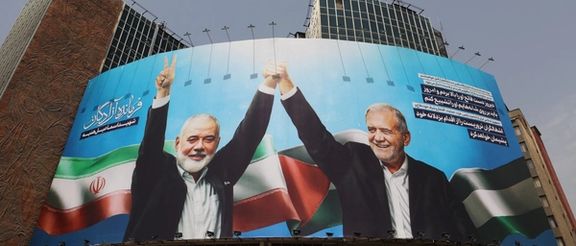Pezeshkian wakes up on his first day as president of an insecure Iran

Iran’s newly elected President Masoud Pezeshkian's first day in office on July 31 proved to be an "eventful "day in the worst possible sense of the word.

Iran’s newly elected President Masoud Pezeshkian's first day in office on July 31 proved to be an "eventful "day in the worst possible sense of the word.
He woke up to the news of the killing of Hamas's Ismail Haniyeh, and started his official business with three days of mourning for the Palestinian figure.
He couldn't even attend his first cabinet meeting, which was held with the previous government's ministers still in office until his own cabinet takes over in two to three weeks. The meeting was led by his much-criticized Vice President, Mohammad Reza Aref, who began the session with a neutral and formulaic speech, carefully avoiding any strong statements. This contrasted with other Iranian officials who vowed revenge against Israel for Haniyeh's death.
A series of other news followed. As the Tehran Stock Exchange experienced one of its biggest crashes, Aref told reporters that the government would "inject funds" into the stock market from the National Development Fund, effectively Iran's Foreign Currency Reserve. Few governments would take such a step, but the Islamic Republic, known for its lack of a clear economic policy, is one of them.
Simultaneously, the exchange rate for the US dollar, which had been around 570,000 rials per dollar the previous week, saw one of its biggest jumps in months, rising to over 610,000 rials per dollar by Wednesday morning. Iranian economist Ali Sarzaim attributed the increase not to economic factors but to the market's reaction to Haniyeh's death.
However, the biggest impact of the news appears to be Iranian's disillusionment about the Islamic Republic's security. Hundreds of tweets during the early hours of the morning contained sarcasm about Iranian officials' constant boasting about the country's security. Iranian journalist Sara Massoumi noted that the attack undermined the reputation and influence of Iranian intelligence.
Some Iranians on social media mocked the government, suggesting it should focus more on protecting its high-level guests rather than sending security forces to the streets to beat and arrest women who defy the compulsory hijab.
Revelations about Iran's intelligence vulnerabilities surfaced just days after Intelligence Minister Esmail Khatib claimed that his ministry had dismantled Israel's influence network within the country. Earlier, former Intelligence Minister Ali Yunesi had warned that even Iran's highest-ranking officials are not immune to Israeli attacks.
Amid calls from many Iranians for the new president to protect and uphold citizens' rights, a popular singer whose song Baraye [For] went viral during the Mahsa uprising in 2022, and who was briefly jailed at the time, tweeted that he has been summoned to prison to serve a 3.5-year sentence—simply for singing the song.
In another development, a report on the conservative Ghatreh News website, as well as numerous social media reports from Lahijan, a city in Gilan Province in northern Iran, say that the city's Friday prayers leader Javad Soleimani, was killed by multiple stabs during what has been characterized as "a personal matter." However, according to the official website of the Qom Seminary, the cleric was "assassinated."
Pezeshkian’s second day in office on Thursday was not much better than his first, as he attended the symbolic funeral of Haniyeh in Tehran University, where Supreme Leader Ali Khamenei recited prayers, as he nervously watched the skies.